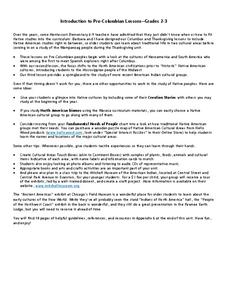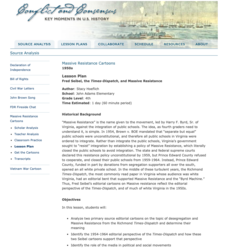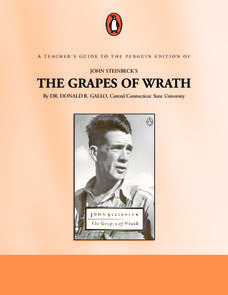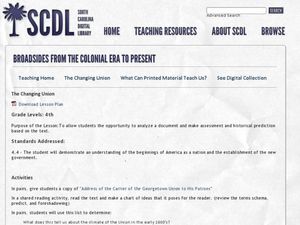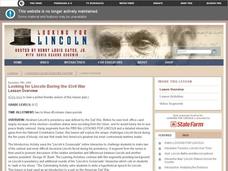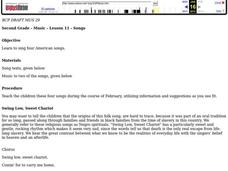Midwest Institute for Native American Studies
Introduction to Pre-Columbian Lessons
Native peoples established civilizations all over Central and North America. Introduce native civilizations with a unit that promotes discussion, reinforces map skills, enhances reading comprehension, and exposes young historians to the...
K12 Reader
Eastern Woodland Natives
Supplement your social studies instruction with a reading passage about the Eastern Woodlands. After reading the passage, learners respond to five related questions.
Roy Rosenzweig Center for History and New Media
Fred Seibel, the Times-Dispatch, and Massive Resistance
A lesson plan challenges scholars to analyze editorial cartoons created by Fred Seibel, illustrator for the Times-Dispatch, during the Massive Resistance. A class discussion looking at today's editorial pages and Jim Crow Laws leads the...
Stanford University
Fort Sumter
The headlines screamed what everyone knew was coming: War! While Fort Sumter was considered the first battle of the Civil War, the engagement played differently in newspapers at the time. Using coverage from Northern and Southern...
Stanford University
Expansion of the Inca Empire
If you could write your own history textbook, what would you include? Learners play the role of textbook writers by examining evidence of the Inca Empire. With primary sources from Spanish and indigenous perspectives, as well as images,...
Curated OER
Making a Report to President Washington
Young scholars gain an understanding of some of the challenges the U.S. faced at its birth. They are asked to compose a report on the state of the nation in 1790 (addressed to President George Washington), which includes a narrative,...
Crafting Freedom
George Moses Horton: Slavery from a Poet's Perspective
After reading about the life of George Moses Horton, the first slave to publish anti-slavery poetry, learners will recall his major accomplishments, provide a summary of the obstacles he faced, and identify common aspects of the...
Crafting Freedom
George Moses Horton: Slavery from a Poet's Perspective
Pupils have the unique opportunity to learn about the institution of slavery by reading first-hand experiences as described by George Moses Horton, the first slave to publish anti-slavery poetry.
North Carolina Consortium for Middle East Studies
Voices from the Trans‐Atlantic Slave Trade
Young historians trace the roots of African slavery and learn about the causes and effects of the Trans-Atlantic slave trade through a PowerPoint presentation and by reading and discussing excerpts from the book Copper Sun.
Curated OER
The Seven Continents Scavenger Hunt
Who doesn't enjoy an engaging scavenger hunt? Here, scholars listen to, and discuss, the informative text, Where is my Continent? by Robin Nelson. They then explore the seven continents and four major oceans using Google Earth.
Penguin Books
A Teacher’s Guide to the Penguin Edition of John Steinbeck’s The Grapes of Wrath
The dry Oklahoma landscape in America's Dust Bowl sent many farmers in search of the promised land. A teacher's guide to John Steinbeck's The Grapes of Wrath discusses the characters' desire for a better home along with other themes and...
The Alamo
The Alamo Then and Now
The Alamo is one of the most famous buildings from the Texas Revolution. But what does it look like today, and how has it changed? Pupils find out more using different interactive modes, including a split-screen and side-by-side version.
Curated OER
Perspective on the Slave Narrative
High schoolers examine narratives of two slaves: iam W. Brown and Frederick Douglas. They produce an essay explaining how Brown's narrative challenged the prejudices of readers in his own time and how it challenges prejudices today.
Curated OER
Brazilian Oval House
Students, after researching the history about Brazil's people, climate, vegetation and natural resources, build a replica of a house utilizing the local materials and construction methods of Brazil. They discover the people and resources...
Core Knowledge Foundation
Volume 1 - A History of the United States: Precolonial to the 1800s
Volume One of the 299-page Core Knowledge History of the United States covers events from the Precolonial Period to the 1800s.
Core Knowledge Foundation
A History of the United States
This 262-page Core Knowledge teacher guide presents an overview of the two-volume History of the United States program designed for middle schoolers. The guide includes information about the learning strategies used, a pacing guide, the...
Core Knowledge Foundation
Colonial America Tell It Again!™ Read-Aloud Anthology
A read-aloud anthology explores Colonial America. Third graders listen to informational texts, discuss what they heard, and participate in extension activities and writing. Take-home materials, assessments, and remediation opportunities...
Curated OER
William Faulkner's "The Sound and the Fury": Narrating the Compson Family Decline and the Changing South
Students read "The Sound and the Fury" and consider the changing narrative structure and voice throughout the novel. They trace the decline of the Compson family.
Curated OER
Apartheid and Segregation
Students view a television program that depicts the history South African Apartheid and the United States' system of segregation. They discuss how laws were used to uphold these institutions and compare and contrast racism and...
Curated OER
Mints Across America
Young scholars research different Mint Facilities that were set up all over the South and other parts of the United States to help with the growing need of extra American coins. Students research location, types of coins produced, and...
Curated OER
The Changing Union
Fourth graders analyze a document and make assessment and historical prediction based on the text. In this establishment of American government activity, 4th graders analyze a poem and discuss the climate of the Union in the early...
Curated OER
Commonalities and Differences from Africa to Cleveland as Evidence Through the Gullah Community Connection
Students explore Afro-American history. They identify the commonality between African, Carolinian and Cleveland Black culture. Students explore the water cycle, oceanography, hydrology and bio-geochemical processes. They discuss the...
Curated OER
Looking for Lincoln During the Civil War
Eleventh graders examine the presidency of Lincoln. In this American History lesson, 11th graders watch various videos on Lincoln and the Civil War. Students read and answer questions.
Curated OER
Songs
Second graders study four American songs that they will sing during the month of February. They discuss the origins and meanings of the songs.


